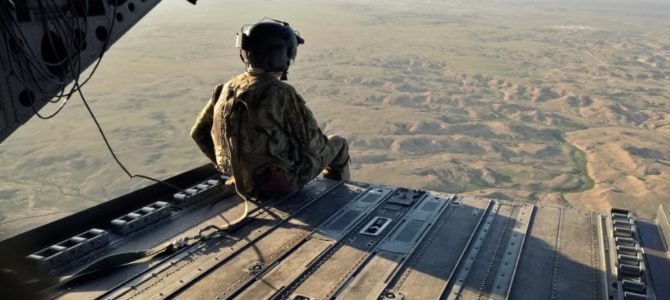
From the White House last week, President Trump told reporters the “worst decision made in the history of our country” was to invade Iraq. To rectify that mistake, he continued, the United States was “getting out of these endless wars — these ridiculous, endless wars.” On Thursday, however, he softened that declaration by saying merely, “at some point, we obviously will be gone (from Iraq).”
It’s time the president exchange that nebulous “some point” with an authoritative date for full withdrawal.
During a joint press conference with Iraqi Prime Minister Mustafa Al-Kadhimi, Secretary of State Pompeo was even more oblique on the timeline. When pressed by a reporter for a date when a withdrawal would begin, Trump turned to Pompeo, who authoritatively said the United States would leave “as soon as we complete that mission.”
He gave no indication exactly what the “mission” was or what criteria would signal its successful completion. This sidesteps an obvious truth: there is no militarily attainable mission. The troops are simply “there.”
A sober assessment of the conditions on the ground in Iraq reveals that there is no threat to American security or vital national interests that necessitates the continued deployment of our combat troops. What little justification existed with the presence of ISIS was eradicated years ago.
After eight years of pointless war in Iraq, U.S. troops completely withdrew from the country in December 2011. They were sent back in just three years later by the Obama administration to shore up Iraqi defenses against the Islamic State (ISIS). That mission was effectively completed in July 2017 when the U.S.-backed Iraqi forces retook ISIS-held Mosul. Iraq declared all of its territory had been retaken from ISIS by December of that year.
Since that time, American troops have been on the ground in Iraq with no mission and no militarily attainable objectives, effectively sitting in various locations in Iraq with targets on their backs, allowing enemy combatants to launch tactical attacks against our troops.
War was narrowly averted in January of this year when Iran launched a barrage of missiles at American troops on Iraqi bases in retaliation for the death of Qassim Soleimani, yet thankfully didn’t kill any U.S. troops. Earlier this month, six additional attacks were made against American troops in a single week, but again, miraculously, not one killed any Americans.
It’s likely only a matter of time before a future attack results in more U.S. casualties. There is no valid reason we should continue to risk our service members; lives in the absence of a valid military mission.
The Iraqi prime minister and his government need to defend their own country. American troops should not be used for the security needs of Baghdad. Kadhimi himself said in an interview following his meeting with Trump that he believes his own troops can defend against ISIS. “We definitely don’t need combat troops in Iraq,” he said, “but we do need training and capacity enhancement and security cooperation.”
While the Iraqi prime minister may desire more training and security cooperation, neither is necessary and in any case, American combat troops and financial assistance are not giving primarily for the benefit of the target country. If there is a benefit to the American people or proving troops demonstrably increases our security, then that’s a discussion we can have. In this case, however, there is no benefit to the United States, and therefore all our troops should be withdrawn rapidly.
That’s not to say the United States should not maintain — or even deepen — diplomatic and economic relations with Iraq. There are many fields in which Washington and Baghdad could mutually benefit from economic, energy, and health engagement. Iraqi internal and external security, however, should be the exclusive domain of Iraqi security forces. It is also important to point out that American security will not be put at greater risk by the withdrawal of our troops.
The U.S. military maintains a never-blinking, uniquely capable global ability to conduct targeted strikes against any threats that may arise against the United States, no matter where in the world they originate — and that includes Iraq. We don’t need troops permanently stationed on the ground there to assure our safety.
It is well beyond time, then, that President Trump withdraws all U.S. combat troops from Iraq to limit the risk to our forces. It should be Baghdad’s responsibility, not Washington, for Iraq’s security.









